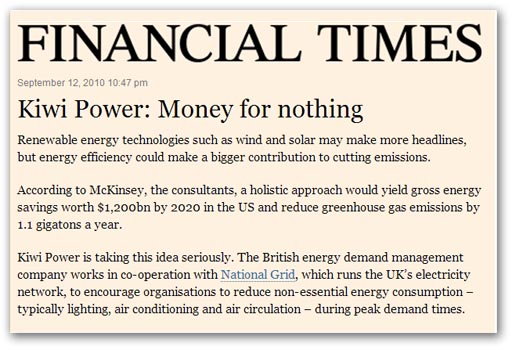Energy: million-pound government windfall when no wind blows
Friday 12 July 2013
Potentially, this "reserve" power is worth hundreds of millions to George Osborne, but it has to be taken from the pockets of hard-pressed electricity consumers. Generator operator will be paid up to £600 per Megawatt hour (MWh), six times the rate paid to inshore wind farm owners.
This is the real explanation behind our the report on the Guardian finding that four NHS hospitals had "signed up to a deal under which they will reduce demand at peak times by using diesel-fired generators". What the Guardian was seeing was the front end of a contract agreed earleir this year between the Government Procurement Service (GPS) and five leading "aggregators". These highly specialist companies are ready to exploit the huge back-up bonanza, making the government, potentially, one of the largest providers of reserve electricity in the country – so much for privatisation. One of the aggregators which featured in the Guardian piece was KiWi Power. To administer the contract, it is working alongside another of Britain's leading aggregators, Flexitricty, which appeared in the Financial Times on 6 September 2010, claiming that private industry "can make millions of pounds annually, and help reduce the UK’s carbon footprint, by selling spare electricity to the National Grid". Now, Government is getting in on the act, alongside private sector firms, all part of what is called "Demand Side Response" of which the National Grid's "Short Term Operating Reserve" (STOR) is part. The Government and the aggregators are benefiting from the National Grid's Aggegrator Model in STOR, introduced in December 2010, a new set of rules which effectively kick-started a new and highly lucrative industry, designed to back-up wind farms and compensate for their intermittent production and unpredictable perfomance. With this new "STOR" system, the aggregators can collect up small amounts of power generated by individual clients, such as asingle hospitals (a 1MW generator fitted in Chelsea and Westminster Hospital illustrated), or an RAF base (pictured at the very top of this piece, newly installed CAT generators at RAF Valley). The power is then "aggregated" and sold it in larger blocks direct to the grid, which will only take units of 3MW or more. The Government contract will rely on "smart grid" technology, which makes this system possible. Remote generators are fitted with computer controls which are linked to the internet. This allows aggregators to communicate with the equipment, even using a basic laptop, to turn generators on and off from their own control centres - sometimes hundreds of miles away.
The power is supplied for short periods when the grid is under stress and needs immediate capacity to replace power lost when the wind dies, giving time for conventional power stations to be started up and brought online.
For Alastair Martin, managing director of Flexitricity, this is the opportunity of a lifetime. His Edinburgh-based company started up in 2008 and, for every six months in the business has doubled the amount of capacity under its management. In 2011, it was hoping to grow enough to replace one coal-fired power station and, by 2014, to manage the capacity equivalent to that consumed by the City of Manchester. Now, with this four-year government "framework" contract under its belt, Martin's company is well on its way to achieving its goal. The power coming from government buildings will, of course, only be used for the short-term balancing. But, says Martin, when it comes to dealing with the daily peaks, "there is more than enough unexploited capacity in the hands of industrial and commercial energy users. They can provide all of the reserve electricity that National Grid requires until 2020 without building a single additional power station". As to, KiWi Power, it is also well aware of how lucrative this contract is. On 20 September 2010, its cyncial message to the Financial Times was that selling capacity to the grid was "Money for nothing". Then disguising the fact that it was seeking to sell "dirty" diesel-generated electricity, it concentrated on making a "green" pitch. It told the paper that renewable energy technologies such as wind and solar may make more headlines, "but energy efficiency" could make "a bigger contribution to cutting emissions".
A holistic approach to energy management according to McKinsey, the consultants, could yield savings worth $1,200bn by 2020 in the US. Kiwi Power wanted to work with the National Grid, to exploit the potential in Britain, for a market that will be worth £1 billion by 2015, equivalent to five percent on electricity bills.
Part of the daily peaks can be reduced by reducing non-essential energy consumption – typically lighting, air conditioning and air circulation. Operations which promise to cut their consumption to order during peak demand times could make £5,000 to £50,000 a year, said KiWi's director, Ziko Abram. But that was never to be the major part of the business. Even at that time, however, he revealed that the real money was in larger sites with back-up diesel generators, selling dirty electricity to the grid.
Public buildings, such as hospitals, prisons, Army bases, and Police and Fire Headquarters, and even Council Officers (above) are among the operations which have these generators. Usually, they are kept for emergencies. But they can be used to earn £100,000 a year from us, just for making their tax-payer funded equipment available to the grid. They take more if they actually produce electricity, and then only if they are not needed by their operators.
The money-earning potential is something KiWi Power has learned from experience. In 2010, in "almost five months" and with just 10 staff, it saved 50MW, the amount needed to power 10,000 houses. At today's inflated prices, this could earn fees totalling £1 million.
Then, the company had twelve clients in the UK, including the Reuben Brothers, a privately held property investor, Cleveland Potash Mining, the only potash mine in the UK, Eden Shopping Centre and London Oxford Airport. But the signs were there. Payments for large, energy intensive operators with backup generators can amount to "millions of pounds" the company told Mining News back in 2010.
By October 2012, KiWi Power had moved into the public sector and had signed up Lister Hospital, part of the East and North Hertfordshire NHS Trust. At the hospital, four new diesel generators had been installed (one illustrated below), giving it 4.5MW capacity to send to the grid. The machinery is controlled via KiWi Power's centre in London, when it is not needed by the hospital, and is expected to earn more than £100,000 a year. The earnings potential of this unit are now to be multiplied hundred and possibly thousand-fold, as more and more generators are brought into the scheme. Leading the way will be NHS hospitals like Lister. The one consolation for weary consumers struggling under the burden of yet another "stealth tax on electricity, is that, if the NHS can't keep its patients alive, at least it can help keep the lights on and earn enough money to pay its chief executives' pensions. Richard North 12/07/2013 |
Post Office sell-off: the EU elephant disappears
Thursday 11 July 2013
The nearest we get is John Harris in the low-circulation Guardian who, while complaining that the sell-off plan is "daylight robbery", manages one sentence, well down his piece, noting that: "The central role in all this played by the EU directives has incurred the wrath of some Conservatives, and plenty of Ukip activists". Indeed the role of the EU has been "central" and you can see not so much the fingerprints as the bootprints on the Commission website here. The privatisation is the government's response to EU's plan to create a "single market for postal services", first set in train with the 118-page Green Paper (COM/91/476) published on 11 June 1992. The problem for EU-watchers is that there is no single Commission or other document – much less a directive - that overtly commands, "thou shalt privatise". But, as we learn from studying the work of the financial consultancy, PwC, "liberalisation" is being used as the Trojan horse for the privatisation process.
The plan was agreed in principle by the member states in 1997 – a poison chalice handed down from Major to Blair - and officially adopted through the third postal directive, requiring most member states to open their postal market to competition at the latest end of 2010.
The fact that the process is slightly delayed is neither here nor there – Mr Cable's announcement this week is in direct response to this directive. PwC gives the game away with this passage: This liberalisation will have a dramatic impact on the incumbent postal operators. The universal service provision won't be funded anymore by the profit making reserved area. The postal operators will have to increase their efficiency and quality in order to keep enough market share to maintain economics of scale. Service offering and prices shall have to evolve to better reflect customer needs. Regulation will have to move from price control avoiding cross-subsidisation to searching a balance between allowing market entry and maintaining universal service provision, possibly with public or sector funding.From there, we see that, while there is no direct requirement for member states to privatise their services, this is a necessary consequence of the third directive. If there is a "smoking gun", it is in a 210-page report produced by Price Waterhouse Coopers for the Commission in 2006, entitled: "The Impact on Universal Service of the Full Market Accomplishment of the Postal Internal Market in 2009". This provision of the European Directive, it said, "constitutes in fact the 'last mile' of the long journey the European Union is undertaking in creating a liberalised internal market for postal services". The overall objective of the EU is, of course, to detach national monopolies from the nation states – key symbols of national identity and control, thence in the fullness of time to create a European postal service. If we eventually see blue-painted post boxes, however, our venal media will still not understand what has been going on. Besotted with Margaret Thatcher's privatisation programme, it will mistake the colour as Conservative party blue, daubed in honour of the former leader. And lest we forget, the postal services directive has been rejected by Norway. Presumably, the law came down on the wrong type of fax, as the Norwegian government in 2004 was very clear that the directive meant the end of state control. Thus, while so many can see it - which is hardly difficult as the same process is happeningthroughout Europe - our media is blind. The invisible EU-lephant is safe from its incurious gaze. COMMENT THREAD Richard North 11/07/2013 |
Thursday, 11 July 2013
Posted by
Britannia Radio
at
22:56
![]()





























